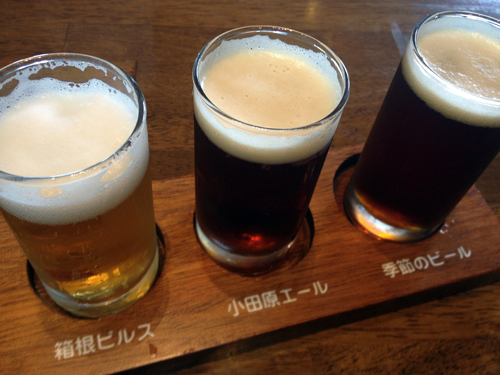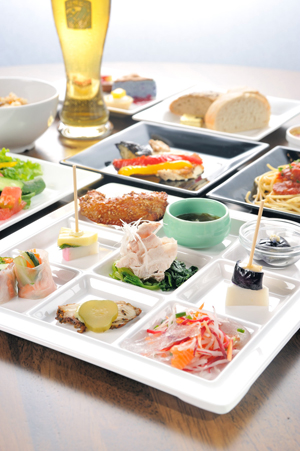
by Ry Beville
Hakone Beer is one of the lesser-known pleasures of Japan’s craft beer scene. The beer is not widely available outside the restaurants connected with its small brewery near the famous mountain hot springs resort area. Really the only other opportunity to try it is at select beer festivals, and Hakone Beer’s participation in those is only very recent. But why try to avoid the trip out there? It’s worth a beer pilgrim’s journey—definitely if you are on your way to or from a hike in the mountains or one of the area resorts. Hakone Beer is also part of a fascinating, family-owned company with several other ventures around the brewery, namely the production of Kamaboko.
Suzuhiro, the parent company, has been producing the popular product since 1865. For those unfamiliar with the food, kamaboko is pureed white fish that uses some additives; it is formed into oblong loaves and then steamed until it congeals again. In the case of Suzuhiro, the process uses only natural additives and, as much as possible, freshly caught local ingredients. The company also understands the need to practice ocean conservation and social responsibilities—company policies reflect that philosophy. Suzuhiro, then, is essentially a craft brewer in the world of fish processing. It’s only appropriate that they would try to produce beer that complements the subtle fish flavors of their many varieties of kamaboko.
That’s not an easy task, says Ishikawa Masaya, who’s in charge of direct sales and operations. What it essentially comes down to is primarily producing beers with equally subtle taste. You won’t find bold, palate-wrecking IPAs at Hakone Beer, but rather highly sessionable beers with great consistency.
Hakone Beer launched in July of 1997 and head brewer Hirota has been with them from the beginning. He, like many brewers in Japan, studied fermentation techniques at Nodai (Tokyo University of Agriculture), with an eye to sake production. A job offer came in from Suzuhiro, however, and he packed his bags to go make beer.
“I first learned from some Kirin employees at Namamugi for two weeks,“ explains Hirota, “and for many years I didn’t change those recipes—I was the assistant brewer anyway and didn’t really have a chance.”
Hirota became the brewmaster in 2002, not without some trepidation, “I had already been working there for five years, but now there were different kinds of pressures. Ishikawa was the manager of our brewery restaurant at the time and he’s a guy who really likes to take on challenges. He wanted to enter our beers in a competition but the comments on our entries were not very good. We realized we needed to change things up and that’s what we did.”
Hirota began to tweak the recipes, concentrating on a simple thought: what’s a good beer? He elaborates, “Well, the fermentation has to go well. And for that to happen, we have to practice sanitation. Basically, I focused more on each particular step of the brewing process to ensure quality. When I came to a crossroads about a particular choice, I only made a choice when I could justify it. I didn’t make any arbitrary decisions with regards to the brewing.”
Hakone Beer’s quality consequently improved and became increasingly recommended among craft beer fans. The brewery has two flagship beers, a crisp pilsner and the Odawara Ale, which is a brown ale. Their regular seasonals change every three months and include the Kazamatsuri Stout in winter, a pale ale in spring, a weizen in summer, and a red ale in autumn. They also brew a few other specialty beers including a refreshing lemon beer, an orange beer and a widely lauded yuzu ale.
Hirota admits, “When we started going to festivals, there were lots of beers I didn’t know about. I was impressed by what Iwamoto was doing over at Sankt Gallen and that’s where I got the idea for our lemon and Valencia orange beers. We don’t use just the juice, but actually peel the fruits ourselves and dump them in. Our pale ale recipe, meanwhile, was based on something I originally got from Kirin, but I wanted something similar to Yona Yona and used that as a basis when tweaking it.”
The best place to try Hakone Beer’s offerings is at Erenna Gosso, their main brewery restaurant. They offer an all-you-can-drink special of three beers (their two flagships plus a seasonal) for a mere ¥1680 for 80 minutes! The restaurant also has a large, varied buffet that includes what else but freshly made kamaboko.
(Additional online content coming soon)

This article was published in Japan Beer Times # () and is among the limited content available online. Order your copy through our online shop or download the digital version from the iTunes store to access the full contents of this issue.



